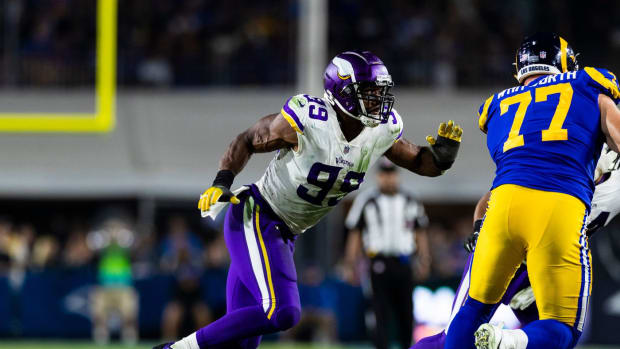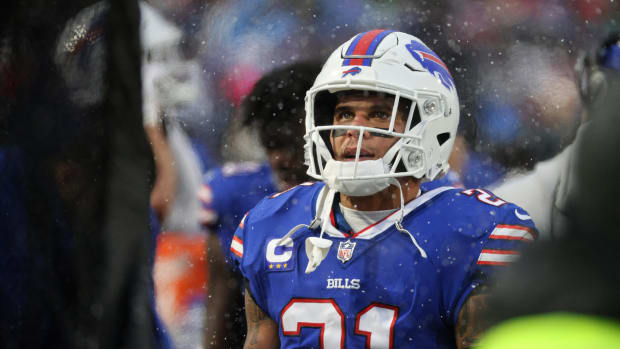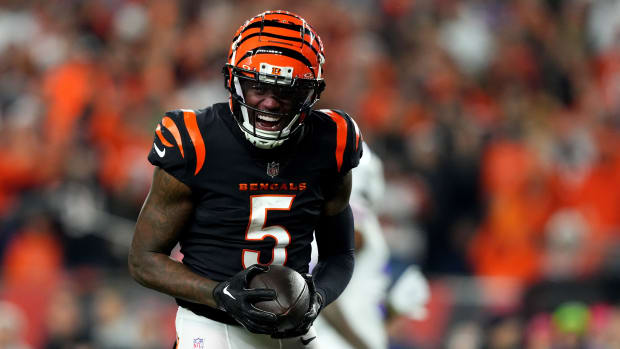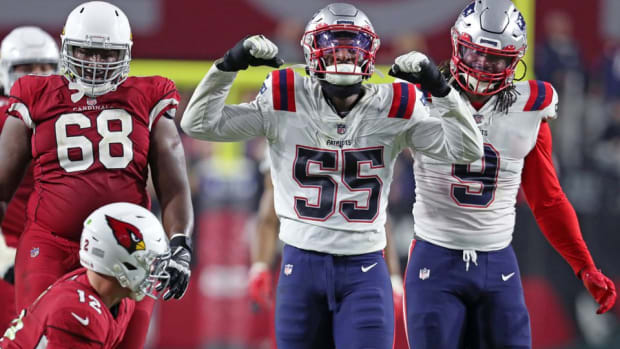The Leaked October Tapes and the Kaepernick Collusion Case
The potential relationship between Colin Kaepernick’s collusion grievance against the NFL and President Donald Trump’s criticisms about players who engage in protest during the playing of the national anthem became more apparent on Wednesday. A New York Times article by Ken Belson and Mark Leibovich reveals excerpts of an audio recording from a meeting at the NFL’s headquarters in Manhattan held last October. It was there where a group of approximately 30 NFL owners, players and league executives met for about three hours to discuss how the league and players ought to address the national anthem controversy of which Kaepernick was a focal point. The meeting was supposed to be confidential. However, an unidentified person recorded the discussion, and the recording was provided to the Times.
As detailed by Belson and Leibovich, several players voiced frustration over the fact that no team had signed Kaepernick. They felt that Kaepernick’s alleged exclusion from the league reflected owners’ opposition to his speaking out about social injustices. Put more bluntly, the players believed that owners and teams had blackballed Kaepernick, who had been passed over by several teams in need of a quarterback.
In response, several owners revealed their fears about further aggravating Trump, who continues to make his opposition to Kaepernick a key political issue. Last September, Trump tweeted a number of statements in opposition to player protests. He urged NFL teams to “fire or suspend” protesting players. The President also connected declining NFL television ratings to fan frustration over player protests.
Trump’s most noteworthy comments about the NFL and the anthem occurred during a campaign rally for U.S. Senator Luther Strange in Huntsville, Ala., last September. “Wouldn’t,” the President asked the crowd, “you love to see one of these NFL owners, when somebody disrespects our flag, say: ‘Get that son of a b---- off the field right now. Out. He’s fired. He’s FIRED!”
During the October meeting at the league’s headquarters, several owners seemed fixated on the President’s reaction to Kaepernick. For example, Patriots owner Robert Kraft—a supporter of Trump—worried that “the problem we have is, we have a president who will use that as fodder to do his mission that I don’t feel is in the best interests of America.” Similarly, Bills owner Terry Pegula worried that “all Donald needs to do is to start to do this again.”
The idea that NFL owners would be worried about the reaction of the President of the United States is hardly irrational. By virtue of the position, the President has significant influence over Americans, including those who might be more or less inclined to watch NFL games or buy NFL merchandise based on the President’s views. Just as relevant, the President plays a critical role in the passage of federal laws that could greatly alter existing legal structures. Such alterations could affect the business of the NFL and its teams. Further, through administrative agencies, the President shapes how laws relevant to the NFL and its owners are implemented and applied.
Along those lines, Trump has voiced serious concerns about tax laws that benefit some NFL owners. Last October, Trump tweeted, “Why is the NFL getting massive tax breaks while at the same time disrespecting our Anthem, Flag and Country? Change tax law!” Trump’s tweet seemingly referred to how NFL teams use tax-exempt government bonds to raise money for the construction of new stadiums. To that point, interest derived from certain kinds of municipal bonds is exempt from federal taxes. If President Trump made it a priority to lobby Congress to change relevant portions of the federal tax code or to pressure the U.S. Department of Treasury that new regulations be considered, it could lead to legal changes that are disadvantageous to owners.
Potential impact on Kaepernick’s collusion grievance
The dynamics described above are potentially relevant to Kaepernick’s collusion grievance against the NFL. Kaepernick’s grievance is based on the assertion that two or more teams, or at least one team and the league, have conspired to deprive him of a collectively bargained right. In the case of Kaepernick, the relevant right is his right to sign with a team.
To prevail in his grievance, Kaepernick must follow Article 17 of the CBA. To that end, he will need to convince arbitrator (and University of Pennsylvania law professor) Stephen Burbank that collusion occurred. Collusion is not easy to prove. It requires by a “clear preponderance of the evidence.” Such evidence (or testimony) must reveal a strategy between at least two teams, or the league and at least one team, to harm Kaepernick. If Kaepernick can only show that several owners decided, on their own, that they didn’t want to sign him because of his political views, he would have failed to prove collusion. Kaepernick must show an agreement to harm him.
Kaepernick has used the grievance process to obtain evidence and depose witnesses, including commissioner Roger Goodell. Perhaps he can prove collusion through texts sent among general managers or through emails sent among owners. Or maybe Kaepernick can prove collusion through damaging admissions made by relevant witnesses. For instance, if team owners or league officials acknowledged under oath that they discussed the benefit of not signing Kaepernick, Kaepernick could assert that they colluded.
This is where owners’ concerns about Trump’s comments potentially fit in. To be clear, Trump himself is not a relevant figure for Kaepernick’s collusion grievance. While supremely powerful, the President of the United States is only a third party in the bargaining relationship between NFL owners and NFL players. In other words, if Trump and an NFL owner agreed that the owner would not sign Kaepernick, collusion has not been proven. This is because Trump is neither a league official nor an owner.
However, if Trump’s comments animated owners and league officials to deny Kaepernick, then it’s possible that Kaepernick would gain a stronger argument of collusion. It is clear from the Times article that owners were worried about Trump’s views and his authority to alter their business model. To the extent those comments led owners to talk about not signing Kaepernick, the NFL could be in trouble. And if Kaepernick can prove collusion, he would likely be awarded millions of dollars in damages and, of more lasting consequence, he would have depicted the NFL and its owners as caring more about social issues or their own reputations than about winning games—a point of particular relevance to NFL fans and NFL sponsors.
Michael McCann is SI's legal analyst. He is also the Associate Dean for Academic Affairs at the University of New Hampshire School of Law and co-author with Ed O'Bannon of the new book Court Justice: The Inside Story of My Battle Against the NCAA.




































